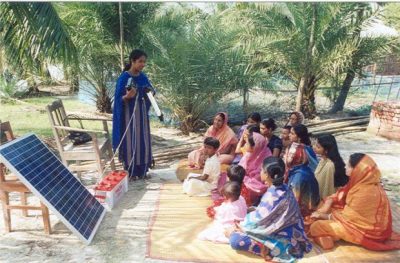By
Sheuli Akter
Millions of Bangladeshis still have no access to electricity because grid electricity is not economically viable in the places they live.
In remote rural areas, Bangladesh has been striving through a number of projects to establish solar home systems (SHS) as a practical and cost-effective alternative for electrification.
Under such projects the Bangladeshi government and its development partners offer the off-grid option which promotes renewable energy sources to provide electricity to remote and hard-to-reach villages.
The Rural Electrification and Renewable Energy Development II (RERED II) Project is one such project which provides electricity in rural remote villages of Bangladesh through solar power and renewable energy sources. Together, the RERED II and its predecessor RERED project have supported more than 3.9 million solar home systems (SHS) in rural Bangladesh benefiting over 20 million people.
The project has introduced and installed 321 solar irrigation pumps and replaced more expensive diesel-run irrigation pumps. These solar powered irrigation pumps benefitted more than 8,000 farmers by reducing their irrigation costs. The pumps also help save the country’s foreign exchange reserve for importing diesel, and reduce greenhouse gas emissions.
The RERED II project has installed seven renewable energy-based mini-grids with a combined capacity of 966kWp and supplied electricity in the remote locations of Swandip, Kutubdia, Bagha and Godagari in Rajshahi, Paratoli in Narsingdi, Nageshwari in Kurigram, and Monpura in Bhola. Nine additional mini-grids, with a combined capacity of 1,071kWp, are under construction. The project will soon start constructing another four mini-grinds with an aggregate capacity of 736 kWp. These mini-grids will help spur economic activities in the rural growth centers by providing access to electricity.
Over 28 million households in Bangladesh still depend on traditional biomass fuel for cooking. The project has introduced improved cookstoves program to help rural women and children – exposed to air pollution from traditional stoves. Forty one NGOs are now distributing these improved cookstoves and selling more than 70,000 every month in rural areas. The project will supply one million improved cookstoves by 2018.
The project is built upon the success of the previous RERED project. The government-owned Infrastructure Development Company Limited (IDCOL) in partnership with non-government organizations (NGOs), is implementing the project. The Bangladesh Climate Change Resilience Fund (BCCRF) has provided US $10 million matching grant support for solar irrigation pumps. The project is also channeling grant funds from the Global Partnership for Output Based Aid (GPOBA) and US Agency for International Development (USAID).
The World Bank board approved US $155 million in 2012 and an additional financing of US $78.4 million in 2014 for the project.



No Comments Yet!
You can be first to comment this post!